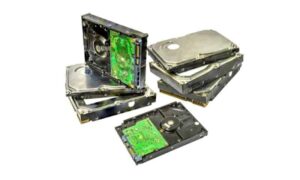A slow computer can be a real drag, making tasks that could take seconds to take much longer. Thankfully, there are some simple fixes you can do to help get your system running quickly again. One of the most effective ways is to keep your computer free of unnecessary files. Unused programs, cookies, and extensions all take up storage space and can cause your laptop or desktop to slow down significantly. To help remedy this, go through your computer regularly to purge unneeded documents and uninstall any apps you no longer use.
You should also make sure to run regular scans for viruses and malware, as these programs can wreak havoc on memory and processing speed. Lastly, many computers come with pre-installed bloatware that uses RAM and processor resources but offers limited value. Find out which programs are safe to remove without affecting performance and delete them if possible. With these tips in mind, you’ll be able to quickly get your computer running at top speed again. So without further ado, let’s jump right in!
Detail Guide To Speed Up Computer
Are you frustrated with your slow computer? Has it been getting slower and slower over time? A huge number of people are struggling with slow computers, but many of them don’t know how to speed up their machines. we’ll share five tips that should help speed up your computer
1. Delete Unnecessary Files And Programs
Unnecessary files and programs can affect a computer’s performance. Not only do they occupy storage space, but they may also eat up memory and other resources. In some cases, these extra files and programs can even lead to stability issues that lag or crash the system.
To avoid any of these problems, it is important to periodically delete unnecessary files. With MS Windows users, this can mean going through ‘Documents’, ‘My Pictures, and other folders, and deleting any unnecessary items like old program installers and large media files. Furthermore, it is generally wise to uninstall any unused programs from the “Add or Remove Programs” list in the control panel.
There are third-party tools like AVG cleaner that can help to automatically clean up a PC by removing temporary files and outdated drivers from the system registry as well. By eliminating these additional burdens on your machine, you can improve its efficiency and make sure your computer runs optimally without unnecessary slow-downs or stoppages.
2. Use A Cleaner To Remove Junk Files And Speed Up Your Browsing
AVG Cleaner can help speed up your browsing experience and make your computer healthier overall. It scans for any junk files that may be consuming unnecessary storage, including recent documents, pictures, downloads, and application files. It also searches for temporary internet data, cookies, log files, cache, and other info stored in the browser.
In addition, it diagnoses the state of your computer’s performance, looks for outdated applications which could be interfering with your browsing speeds or creating security vulnerabilities and provides safeguards to ensure that you are not tracking user behaviour or maintaining outdated versions of software.
AVG Cleaner is easy to use and helps streamline browsing experiences by removing annoying pop-ups and additional content. It will help you clean out extra junk from your windows PC or Mac so that it runs more efficiently no matter what environment you are working in. Experience less sluggishness when loading multiple pages online with AVG Cleaner today!
3. Defragment Your Hard Drive
Fragmenting your hard drive is an important part of keeping your computer running smoothly. Over time, with the frequent writing and deleting of data, files become fragmented on the disk. This means that instead of being stored in one continuous block, they are split up into multiple pieces that are scattered around the disk surface.
As a result, the system takes much longer to find them when they’re needed, slowing down the overall performance of your computer. To fix this problem, it’s important to defragment your hard drive regularly. During defragmentation, fragmented data is found and reassembled so that it can be stored in single consecutive chunks again.
This reduces access times and helps improve system speed without any further intervention or maintenance required. Defragmenting your hard drive may seem tedious, but taking a few extra minutes to clean up a mess can save you plenty of time and frustration in the long run.
4. Clear Browser
When trying to speed up your computer, one of the first steps should always be to clear out any excess clutter that may be clogging up your browser. Digital “clutter” often accumulates without users noticing it due to actions such as downloading files or saving automatic bookmarks. While individually, these items may seem minute and insignificant, collectively they can impede your computer’s processor and other software processes, making it difficult for them to run at optimal levels of efficiency.
To start cleaning up your browser, look for a “clear cache” or “delete history” option in your settings and delete temporary internet files stored on your hard drive. Additionally, make sure to regularly clean up the downloads folder by deleting old hardware/software programs you no longer need and using anti-virus software to protect from any malicious file downloads.
Performing these routine tasks can help reduce instances of freezing or crashing while also freeing up valuable RAM space. Overall, taking the time to clean out your browser is a relatively straightforward process that can help maximize the speed of your computer.
5. Upgrade Ram
As technology continues to evolve, computers often find themselves running slowly after only a short time. This performance lag can be caused by a variety of factors, like faxing issues, printing issues, and security breaches but one of the most common is RAM (Random Access Memory) overload. You can resolve fax issues by moving to cloud fax. You can resolve printer issues by using a cloud print server.
However, RAM is responsible for storing your computer’s information while it’s in use. Over time, RAM can become full, resulting in slower speeds and lagging operations until more storage space is made available. To address this issue, you need to upgrade the computer’s RAM. Installing additional RAM modules on your motherboard can expand your computer’s capacity exponentially and potentially increase its overall speed and performance.
This upgrade involves the physical installation of new modules as well as changes to system configuration settings, so it should only be undertaken by someone with the necessary technical knowledge or with professional assistance. With an upgraded RAM module, you can look forward to faster program launch times and smoother multitasking throughout your workday. Whether you’re using your computer for business or pleasure, upgrading your RAM will breathe new life into an aging machine.
Conclusion
Whether you’re a student, working professional, or just trying to keep up with your online life, chances are you rely on your computer to help get the job done. But what happens when that trusty old PC starts slowing down? Don’t worry, Just follow these simple steps and you’ll be back to cruising the internet in no time.



































